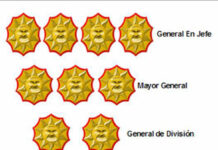[Ray McGovern sat down with Lou Wolf and Chris Agee, co-founders of the new CovertAction Magazine, recently relaunched in May 2018. This interview, which is part of a series of interviews we will be bringing you in segments, is part of what we are calling “the McGovern Tapes.” They were recorded back in August of 2018. In this initial part of the interview, Ray reflects on CIA torture activities and addresses the question of whether the new CIA director, Gina Haspel, will, as she purports, discontinue the CIA torture program.—Editors]
Louis Wolf: Our first question relates to Gina Haspel. I should just point out that we have just posted on our webpage the transcripts of the torture documents which were obtained by the Federation of American Scientists…
Chris Agee: And the National Security Archive, right?
Louis Wolf: …and the National Security Archive…in which she is implicated directly in torture, and she’s actually narrating one of the torture sessions. So what would be your views on her and on this?
Ray McGovern: So what you just said, of course, is the bottom line. She’s a torturer. It was hard to read those National Security Archive documents released through the FOIA process. I did read them. I forced myself to read them just as I forced myself to read the executive summary of the Senate Intelligence Committee report back … well, that was issued in the 9th of December 2014.
These are heinous things, all the more heinous since they lied about them. Yeah, they were told by these lawyers, already corrupt lawyers, that they could do this if it was … “we’re getting good information”, and they lied. “Yeah, yeah, we’re getting great info. Yeah, we’ll we’re getting great info.” It was a total lie, and it was really just by happenstance actually. You know, people don’t realize that the way the senate intelligence committee got access to original CIA documents, cables from the field, is because Gina Haspel and her boss Jose Rodriguez destroyed the video tapes that they had of the torture sessions.
Now, once that became clear, even the Senate Intelligence Committee, which often winked at things like torture, even they weren’t high dudgen, and even people like Saxby, the Republicans and the Democrats, “We have to investigate! We have to do an investigation of this!” Right? And they made Panetta promise that he’d give access – Panetta was the CIA director at the time – to the original CIA documents.
Now, that started the whole process. It was four years in the doing of it. There were all kinds of infringements worked on the investigators by the CIA. And some miracle, somebody in CIA, advertently or inadvertently, put into the hopper, that is, into the Senate computers, the so-called “Panetta review”. This was something that Panetta had ordered up for himself, “tell me what really happened” and all, and once that was … once the agency, once Brennan found out about that, he got so angry that what’d he do? He had his guys hack into the Senate committee computers.
So what I’m saying here is this is a very bad story, and maybe the worst is the fact that Obama aided and abetted Brennan to the very end. Brennan was really sort of a case officer for Obama, that Obama was afraid of him. And so Obama had his chief of staff, McCullough? Yeah, I think it’s McCullough [Editorial Note: Obama’s chief of staff’s last name was McDonough] … attend every one of the sanitization sessions. Can you imagine? His chief of staff going to the place where the Senate Committee would get together with the CIA and they’d say, “Well we need to delete that” and he said “So you don’t worry, do that.”
So this guy went to every session. So bottom line here is that they wanted to slow-walk it so that that Feinstein, who supported her people, her young investigators, they put their heart into it, right? I mean, wouldn’t you if you saw this heinous stuff and the lying and the deceit? In the end, she wanted to support them, so she goes to the President and she says, “You know, we have to release this report.” “Oh, no no no … it’s too sensitive.”
By chance, and this is the luck of it, Mark Udall lost his bid for reelection, and he felt just as strongly as Ron Wyden that this was beyond the pale. And I’m not sure this is exactly the way it happened, but I’m pretty sure something like it happened. Udall went to Feinstein, the chair, and said “Diane, you tell the president that if he doesn’t release the executive summary that’s already been sanitized, I’m going to read the whole thing from the floor of the Senate. What do I got to lose? You know, I’m a short-timer.”
And I think that’s how she got it sprung loose. She went to the president and said, “Look, that’s what’s going to happen. Your choice. The sanitized version, you release it, or a sanitized version, or maybe not even sanitized version, Mark Udall releases it.” So the President, I’m sure that part … called John Brennan, says, “John, I’m sorry. The jig’s up here. Gotta release it.” And then of course, they try to back and fill, but the main conclusions were these heinous things … rectal feeding. What the heck is rectal feeding? Never indicated. Rectal hydration? Only in very, very limited medical applications, no indication that they were needed. And you know, the walling, banging people’s heads against the wall, putting them in small boxes and putting insects in there. Small boxes where they couldn’t even stand up, you know. Then large boxes where they could stand up but they couldn’t move.
Rectal feeding, wall slamming, banging people’s heads against the wall, putting them in small boxes with insects, sleep deprivation, stress positions…
You know … it’s right out there, and all this stuff-
Louis Wolf: Wall slamming, sleep deprivation, the whole list.
Ray McGovern: The whole list of it, and it’s right there in these cables. So what I’m saying here is that Gina Haspel was the pioneer. She ran the first interrogation site, black site, in Thailand. We all knew that. And I guess the thing for me was that when the open hearing on her nomination was finally arranged and she was there, I was there. I live in Washington, so I can always go to these things. So Wyden says, “You know, this is quite remarkable, Ms. Haspel. You classified a lot of things. Who’s the director right now?”
“Well, I am, Senator Wyden.”
“Well, did you classify all this?”
“Yes, I did.”
“Well, don’t you find that a little bizarre that your information, your own biography, you know …”
“Well, no sir.”
Wow, okay. So then he runs out of time. Then Feinstein. “Ms. Haspel, were you there in Thailand when al-Nashiri was being waterboarded, yes or no?”
“Senator, I would love to answer that question, but it’s classified, and …” Blah blah blah. And then Feinstein’s out of time, and she would’ve said if she had her wits about her, “Well, Ms. Haspel, could you tell me who classified that?” And she’d say, “Well, actually I did.”
So here I am looking at C-SPAN and all these cameras and everything, and this is an open hearing, so the American people can find out what kind of person this is. As soon as the guard between me and Haspel went to the bathroom, I went to her, very politely said, “Excuse me for interrupting, but I think Senator Feinstein, Senator Wyden, are entitled to a decent answer. You already know the answer.”
Then four guys–and their tactic these days is to shout “Stop resisting! Stop resisting!” –And they have me, you know, up … six feet up in the air and they’re yelling “Stop resisting!”
But “stop resisting” does a couple things. Number one, it builds a case that you were resisting, and then number two, you can’t hear anything I say anymore. It’s just the “stop resisting”.
So anyhow, yeah. It’s a long answer to a simple question, but I find it just beyond the pale that the Senate Intelligence Committee, in full knowledge of this person being in charge of torture at this first black site, and people like Richard Burr, the chair, having been in the House Intelligence Committee, having probably approved that back in 2001, 2002. See? It’s all very, very convoluted and they’re all doing it … it’s all sort of a happy family.
And you know, you talk about oversight? It’s not oversight. It’s overlook committee. That’s what they do. Senate Overlook Committee.
In July of 2006, it became pretty clear that we were torturing people at these black sites, and so the White House let it be known that George W. Bush was going to explain everything, right? Going to go before the media and explain everything. It was the 6th of July, 2006. And to his great credit, the head of Army intelligence … I’m a little prejudiced because I was an army officer. His name was John Kimmons, and he arranged to go before the Pentagon right across the river at about the same time, and what he said was this:
“No good intelligence has ever come from harsh interrogation techniques” John Kimmons, head of Army intelligence
History shows that, and the experience of the last five years, hard years, also demonstrates that.” Period, end quote. Whoa, last five years, huh? 2006, minus five … oh. Isn’t that when Gina Haspel and her friends were devising these enhanced interrogation techniques?
Now, why do I say that was gutsy? Because Kimmons knew damn well what George Bush was going to say right across the river at about the same time, and he felt an obligation to the Constitution, which we all … not only Army officers, but we all swear a solemn oath to support and defend against all enemies, foreign and domestic. Okay, so here’s Kimmons in his own way choosing a principled stand referring to five years as being sad years and saying without any hesitation that no good intelligence has ever come from harsh interrogation techniques. Whoa. That’s something.
So, what happens? Bush gets up and he says, “You know, these are very very bad guys, and we need to do more than just the normal interrogation techniques, so we did …” what he called an “alternate set of procedures.” That was Bush’s word. And that gradually became “enhanced interrogation techniques.”
“enhanced interrogation techniques” is a direct translation from the German Gestapo manual – “Verschärfte Vernehmung”
Now, the bright fellow or woman who came up with “enhanced interrogation techniques”, I hope … I hope that he or she didn’t realize that “enhanced interrogation techniques” is a direct translation from the German, “Verschärfte Vernehmung”. “Sharpened interrogation techniques”. Sharpened, “verscharfte”, or “enhanced” interrogation techniques. Why do I mention that? Because that was the heading of a chapter in the Gestapo manual. “Verschärfte Vernehmung”. And under that heading were all the techniques, save one or two … let’s call them “enhanced”, enhanced interrogation techniques that these crazy psychiatrists or psychologists came up with.
[James] Mitchell and [John “Bruce”] Jessen, yeah. So there they were, pretty much the same techniques. So not only was the rubric the same, not only the chapter head the same…
Now, my god. What does that tell you? Well, certainly it tells you that even from a PR point of view are you going to use a direct translation from “Verscharfte Vernehmung” and the Gestapo manual? Well, I suppose if Dick Cheney is going to protect you, sure, you use whatever moniker you want.
So … it’s just so distressing that people were so easily suborned into doing this. And of course, you know when push comes to shove you have to remember that all this was done with the express approval of a fellow named George W. Bush. These smart lawyers, most of them working for Cheney–Addington is one of them–they said, “Yeah, look, Mr. President.” Now this is a memo signed by Alberto Gonzalez, the President’s lawyer at the time, but really drafted by Addington, Cheney’s lawyer.
And the whole thing was, “Look, Mr. President, you should know there’s the Geneva Conventions and it’s a little complicated, but we can exclude categories of prisoners. We can say al-Qaeda…we can say they’re not deserving of Geneva protections. And you can do that and probably escape any opprobrium later should some mean-spirited lawyer try to say you’ve violated Geneva. Just by your edict, you can avoid that.” So out came a memorandum dated 7 February 2002.
To hell with Geneva: ‘We shall treat detainees humanely, as appropriate, and as consistent with military necessity…’
The upshot of it was, the final conclusion, was “We shall treat prisoners humanely, as appropriate, and as consistent with military necessity.” Period, end quote. So to hell with Geneva. We are excluding al-Qaeda detainees, we’d call them, from the Geneva protections. We’re doing this unilaterally, and “Humane Treatment” was what the title of this memo was. And that was the upshot. We shall treat prisoners, or detainees humanely, quote, comma, “as appropriate, and as consistent with military necessity.” Period, end quote. February 7, 2002. Sent to all of George Bush’s top advisors. So the Vice President, head of the CIA, head of the Defense Department, head of the State Department, and on down the line. Chairman of the Joint Chiefs of Staff.
All these folks were given the memo, and not one of them, not even Colin Powell, who knew what this would mean, and who had remonstrated and then had been overruled by these lawyers … that’s the kind of guy Powell was.
So what I’m saying here is that when people had questions in the field, the very trite, very simple answer was “The President ordered it, the President ordered it. Here’s the memo, the president ordered it.” Abu Ghraib? “President ordered it, president ordered it.” So George Bush deserves the credit, so to speak, for this whole thing, and it got pretty messy as everyone knows and we do have a record of the CIA cables and so forth. That is, we did. All we have now is an executive summary, sanitized but still very telling, and the first thing that the senate committee chair, Richard Burr, did when he came in in January 2015, was to recall all copies of the Senate Intelligence Investigation of CIA torture.
Now, I’m sure that Gina Haspel was the first one to run to his door and give him her copy. And I suppose the others complied too. There were only five or six out there. There’s supposed to be one in Obama’s library, you know, in his presidential library. But I’m sure that if they told him, “Hey, you have to destroy this,” he would do it in a lick. So that’s the kind of guts he has. So that may be lost to history, but the people who prepared it are still around and we do have the executive summary, which frankly is quite bad enough, you know.

CovertAction Magazine is made possible by subscriptions, orders and donations from readers like you.
Blow the Whistle on U.S. Imperialism
Click the whistle and donate
When you donate to CovertAction Magazine, you are supporting investigative journalism. Your contributions go directly to supporting the development, production, editing, and dissemination of the Magazine.
CovertAction Magazine does not receive corporate or government sponsorship. Yet, we hold a steadfast commitment to providing compensation for writers, editorial and technical support. Your support helps facilitate this compensation as well as increase the caliber of this work.
Please make a donation by clicking on the donate logo above and enter the amount and your credit or debit card information.
CovertAction Institute, Inc. (CAI) is a 501(c)(3) non-profit organization and your gift is tax-deductible for federal income purposes. CAI’s tax-exempt ID number is 87-2461683.
We sincerely thank you for your support.
Disclaimer: The contents of this article are the sole responsibility of the author(s). CovertAction Institute, Inc. (CAI), including its Board of Directors (BD), Editorial Board (EB), Advisory Board (AB), staff, volunteers and its projects (including CovertAction Magazine) are not responsible for any inaccurate or incorrect statement in this article. This article also does not necessarily represent the views the BD, the EB, the AB, staff, volunteers, or any members of its projects.
Differing viewpoints: CAM publishes articles with differing viewpoints in an effort to nurture vibrant debate and thoughtful critical analysis. Feel free to comment on the articles in the comment section and/or send your letters to the Editors, which we will publish in the Letters column.
Copyrighted Material: This web site may contain copyrighted material the use of which has not always been specifically authorized by the copyright owner. As a not-for-profit charitable organization incorporated in the State of New York, we are making such material available in an effort to advance the understanding of humanity’s problems and hopefully to help find solutions for those problems. We believe this constitutes a ‘fair use’ of any such copyrighted material as provided for in section 107 of the US Copyright Law. You can read more about ‘fair use’ and US Copyright Law at the Legal Information Institute of Cornell Law School.
Republishing: CovertAction Magazine (CAM) grants permission to cross-post CAM articles on not-for-profit community internet sites as long as the source is acknowledged together with a hyperlink to the original CovertAction Magazine article. Also, kindly let us know at info@CovertActionMagazine.com. For publication of CAM articles in print or other forms including commercial internet sites, contact: info@CovertActionMagazine.com.
By using this site, you agree to these terms above.
About the Author

Ray McGovern was a CIA officer from 1963 to 1990. As a CIA analyst in the 1980s, chair of the national intelligence estimates, McGovern prepared the president’s daily brief.
He received the Intelligence Commendation Medal at his retirement, only to return it in 2006 to protest the CIA’s involvement in torture. Ray McGovern now works with Tell the Word, the publishing arm of the Ecumenical Church of the Savior in inner city Washington.
During his 27-year career at the CIA he worked for 9 CIA directors, several of them at close remove. Primarily a substantive analyst and briefer, he nonetheless served in all four of the CIA’s main directorates, and during one of his postings abroad helped manage a large covert action project.
McGovern’s post-retirement work also includes commenting on intelligence issues, and in 2003 co-founding Veterans Intelligence Professionals For Sanity, otherwise known as VIPS.










